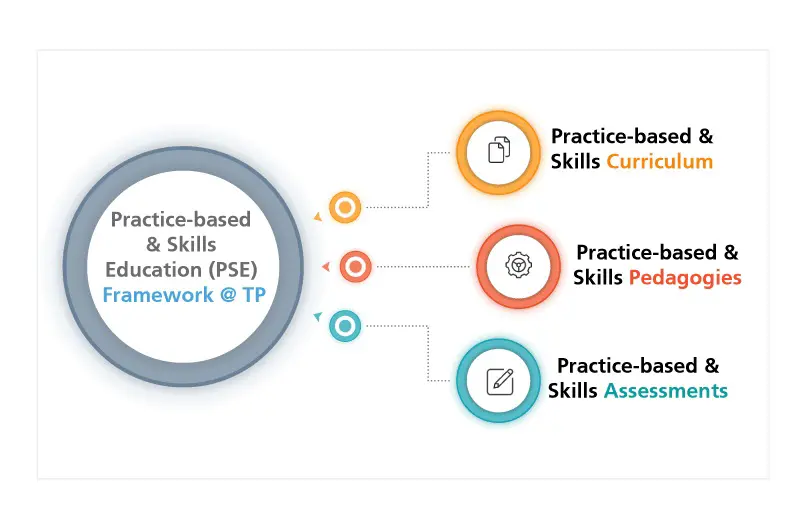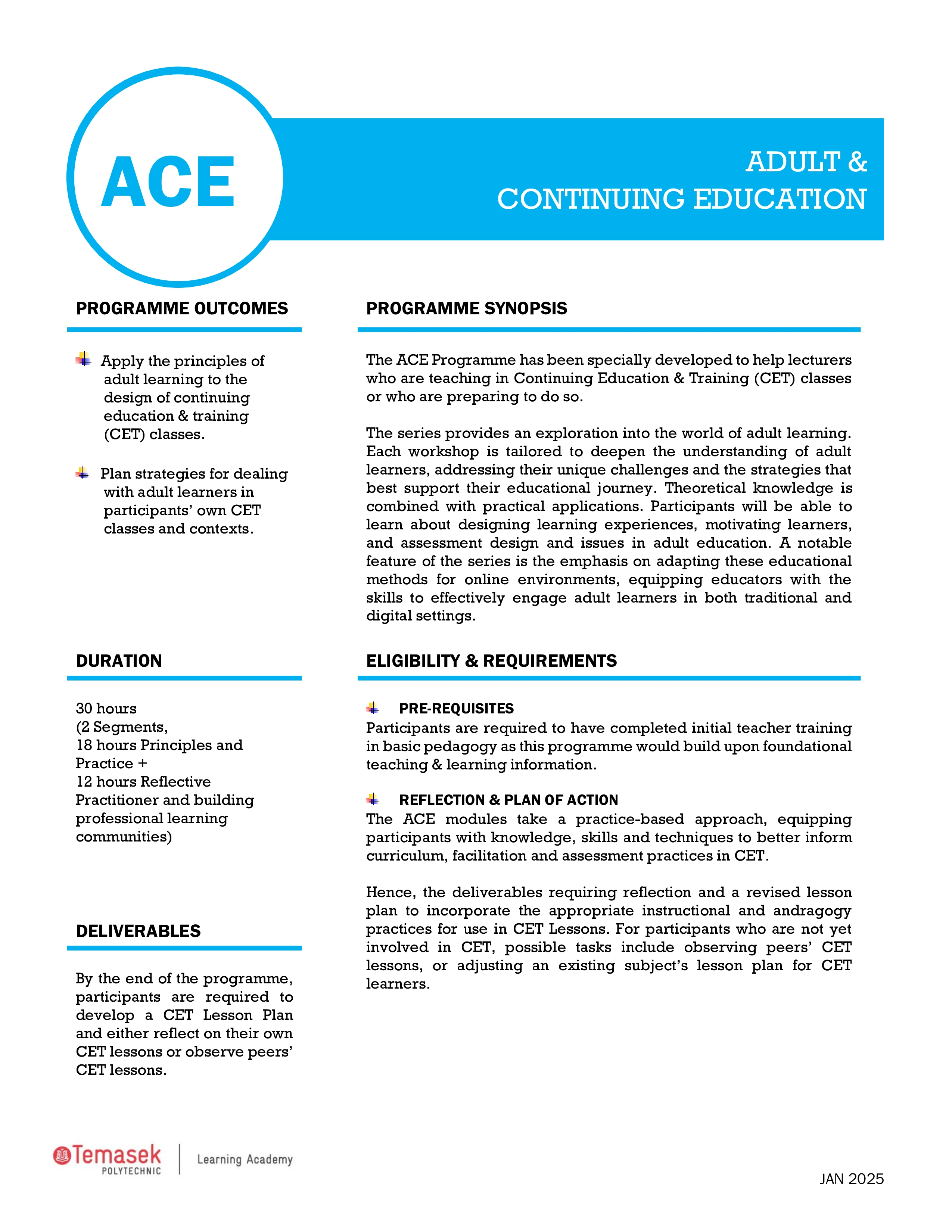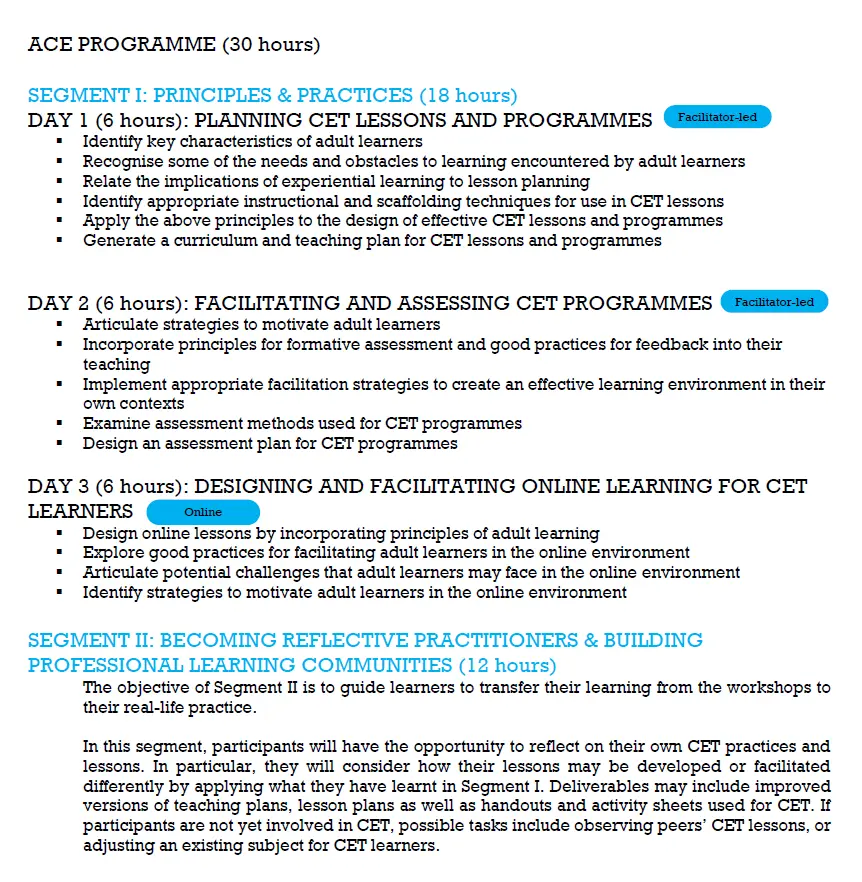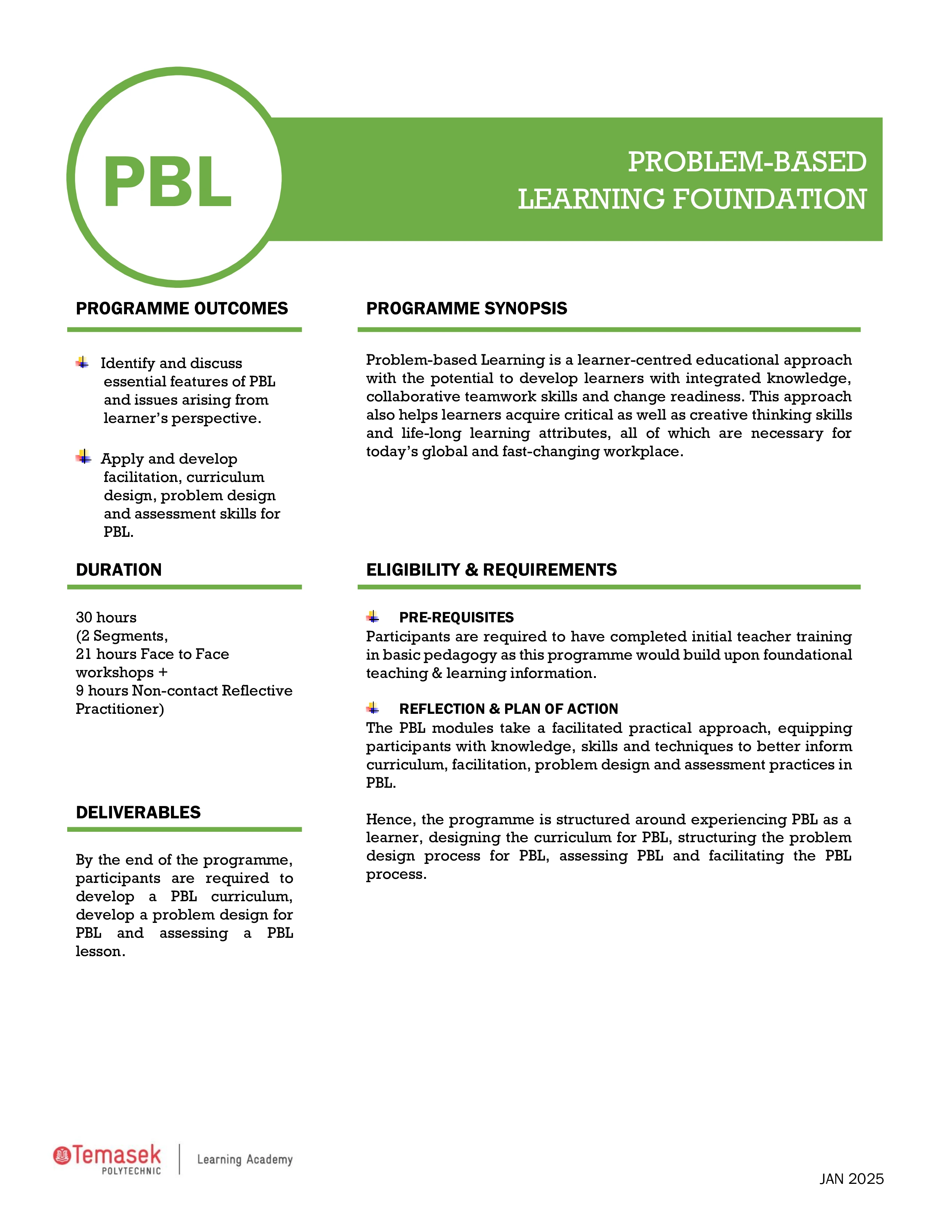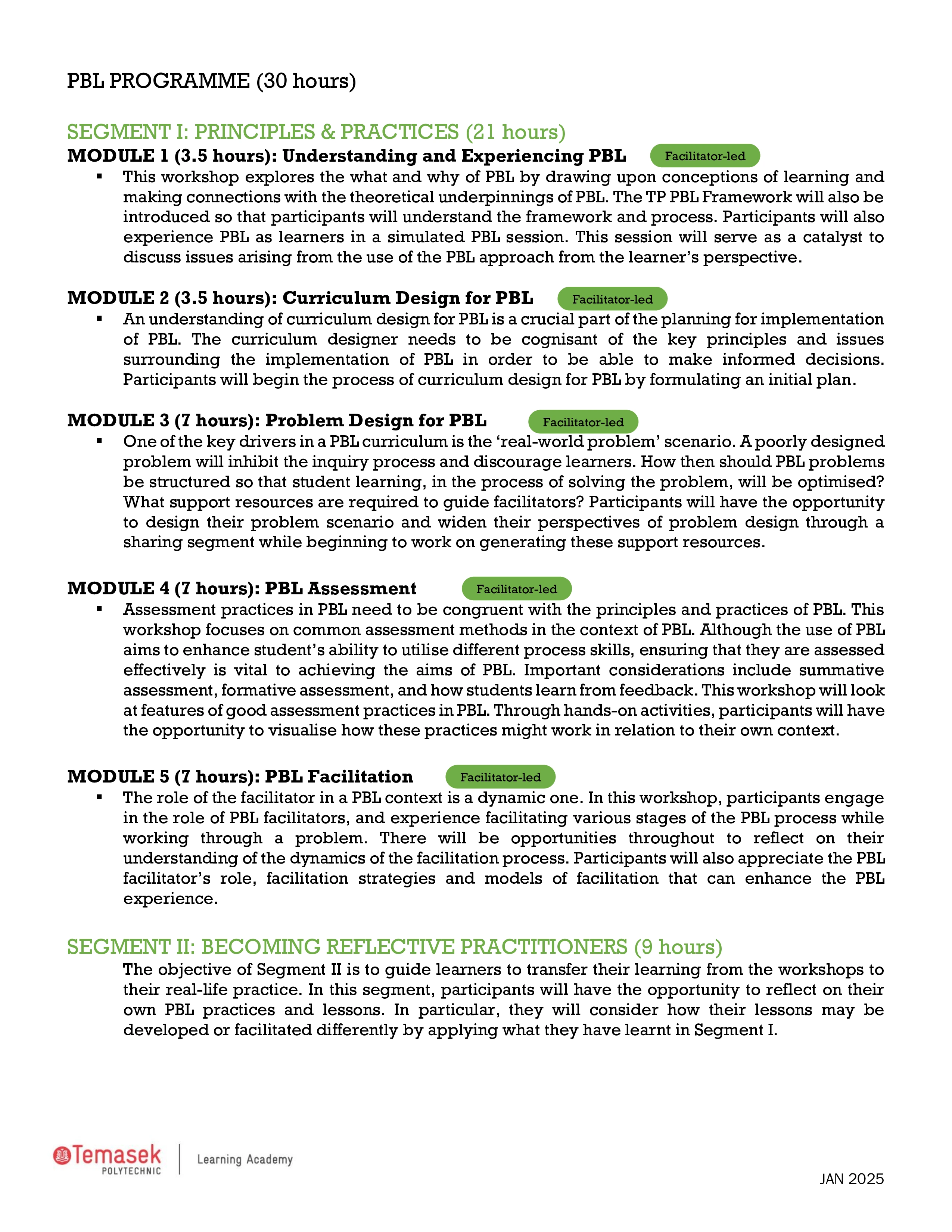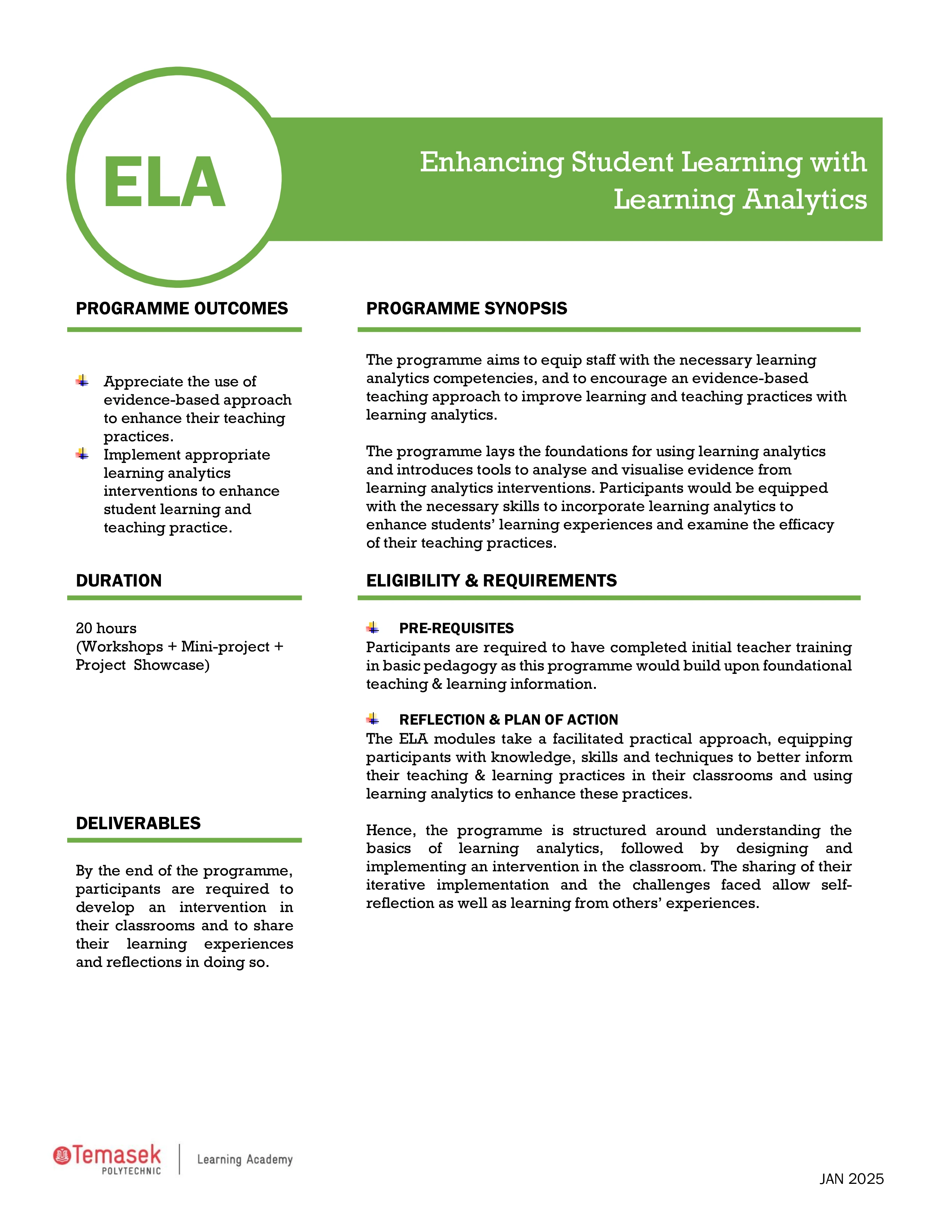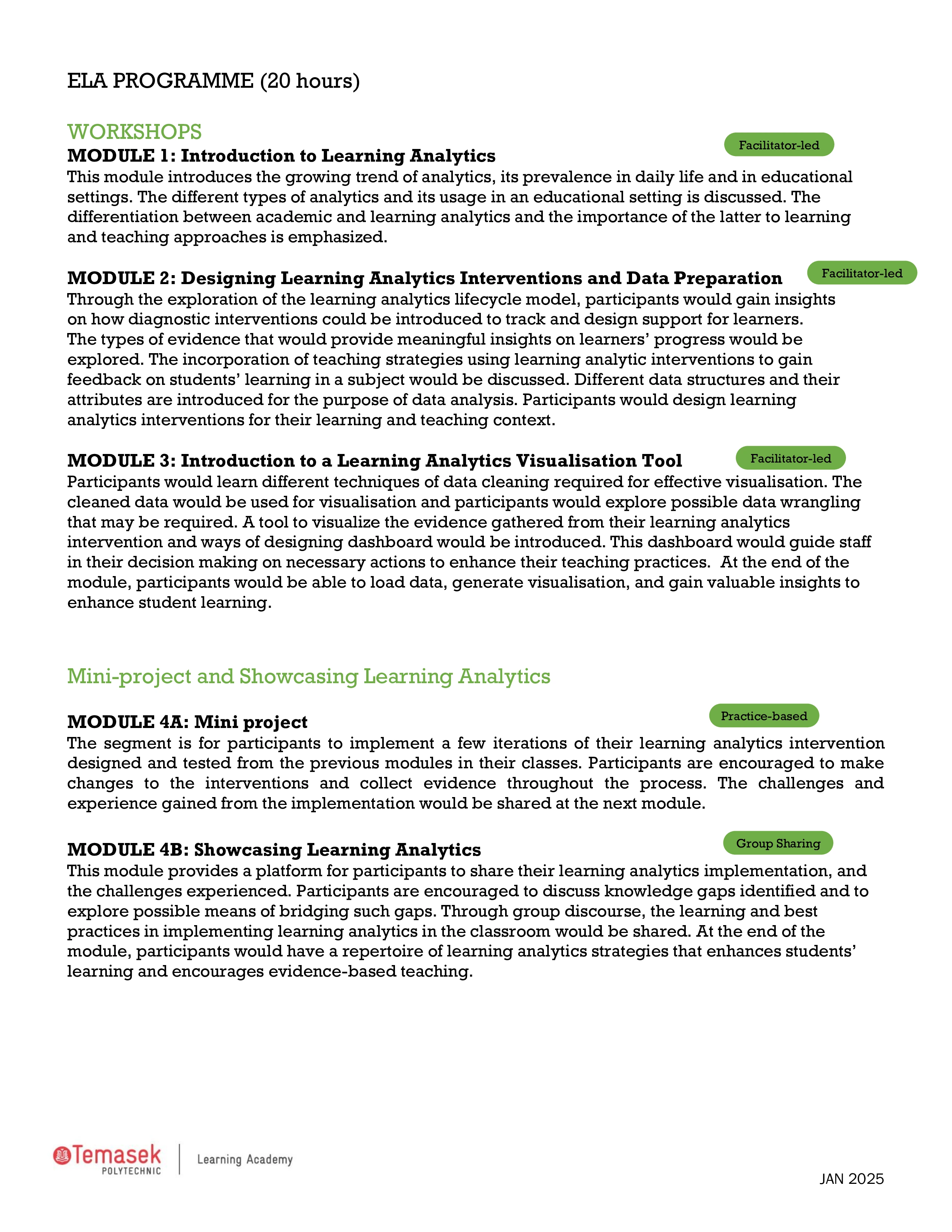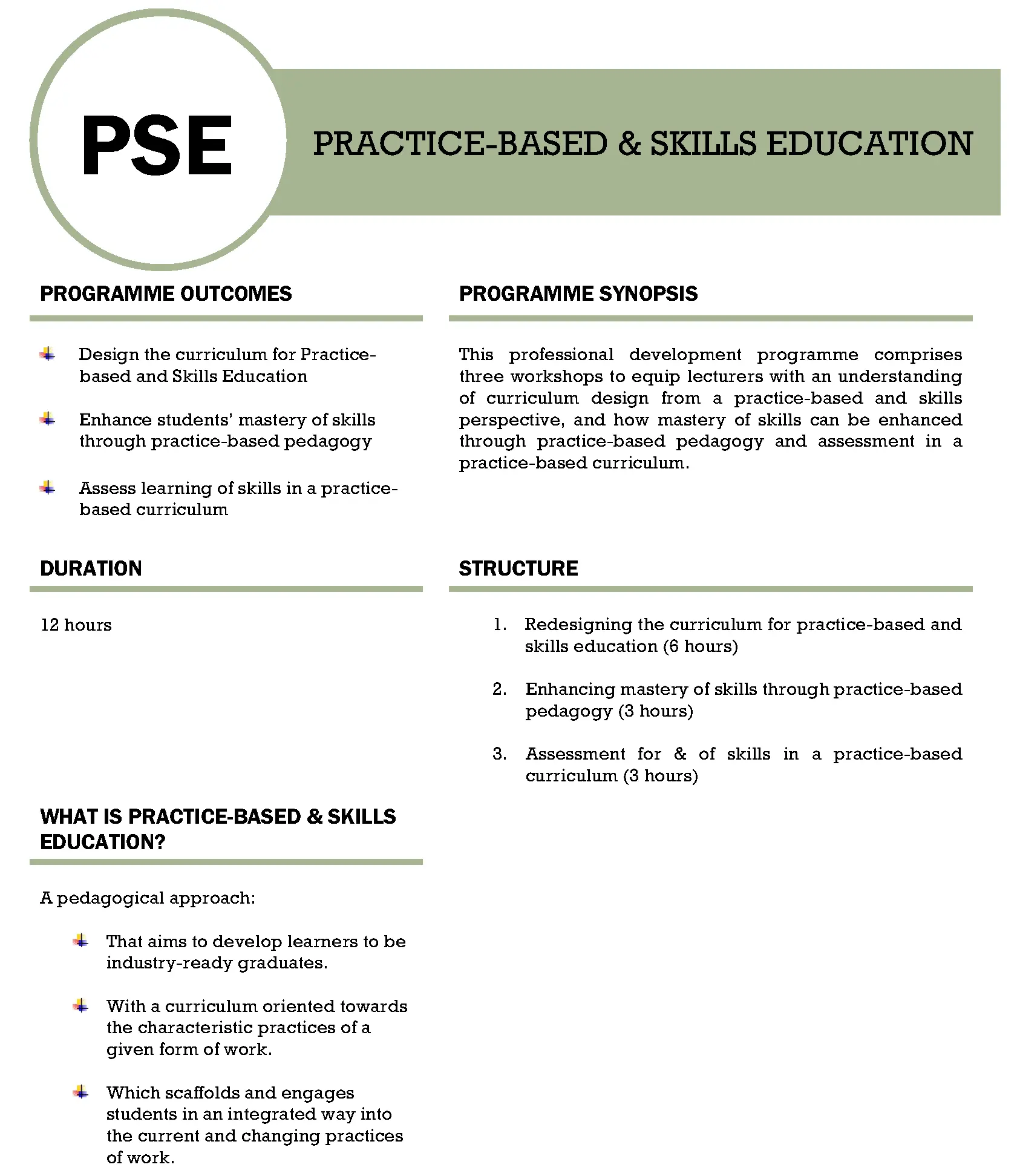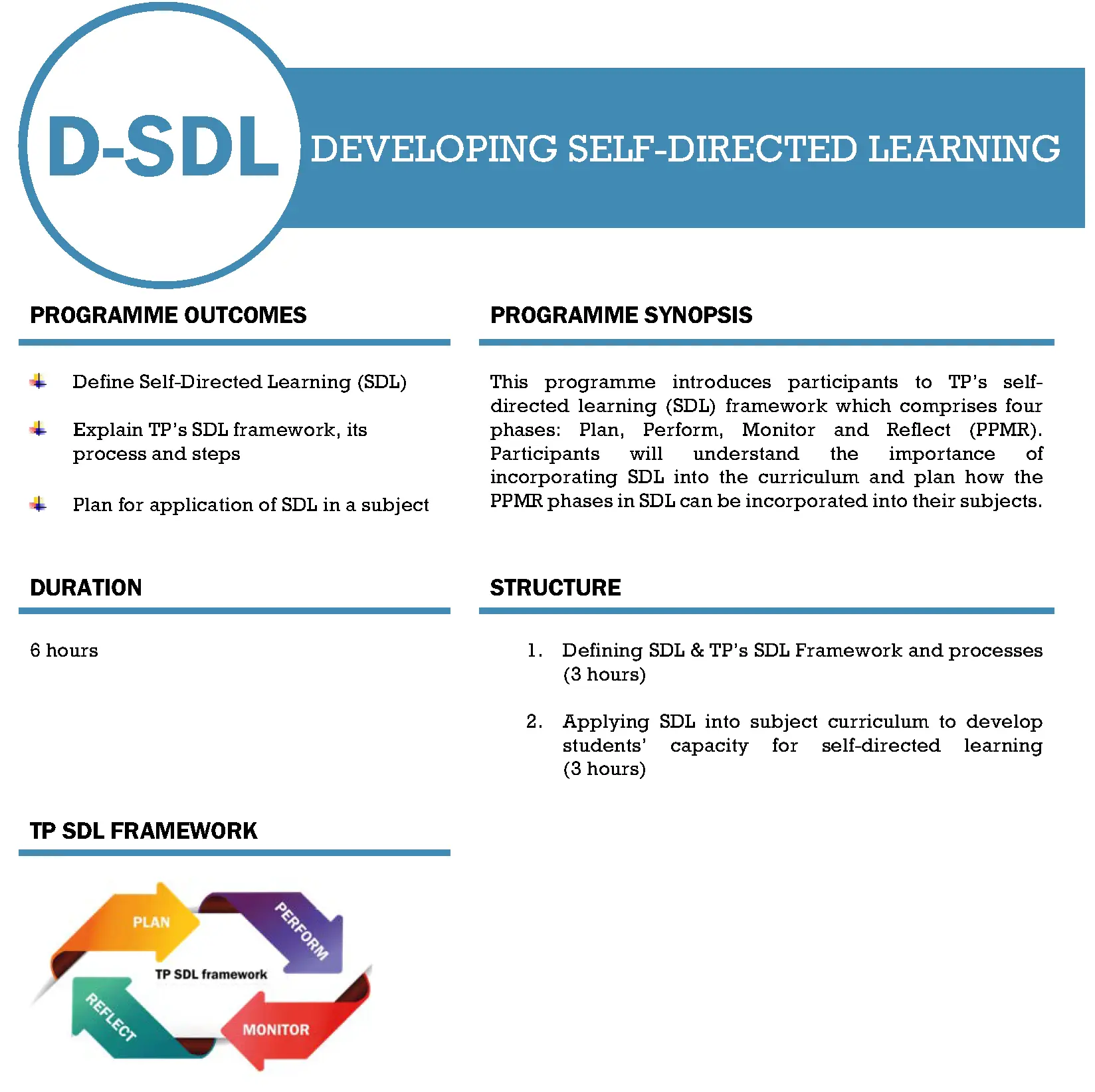TP adopts a Practice-based & Skills Education (PSE) Framework that deepens the focus on providing authentic learning to prepare learners for and in the working world. With curriculum, pedagogical and assessment practices aligned with industry needs, in collaboration with industry partners and simulated and real-world environments, students can apply their learning to the real-world. Equipped with the skills, knowledge and values of the profession, the students are ready to embrace the challenges of the working world.
Overview
The Learning Academy is committed to the development of staff capabilities.
We aim to support TP's teaching staff in providing learning experiences that prepare learners for and within the industry. We assist the diploma teams to adopt relevant TP frameworks as well as good teaching and learning practices.
The Learning Academy also develops and conducts professional development programmes for TP’s staff in areas such as learning-teaching, the use of technology for learning, including e-learning, and learning analytics. We provide opportunities for continuing professional development by guiding teaching staff in their teaching journey and learning from each other in professional learning communities. We also support TP’s polytechnic-wide initiatives in areas such as data-enabled learning and personalised learning.
In addition, the Learning Academy researches the efficacy of initiatives on students’ learning in areas such as self-directed learning, problem-based learning, technology-enhanced learning, and learning analytics.
The Learning Academy engages in external e-learning and microlearning consultancy and development projects for and with corporations and clients from the private sector and government agencies. We work closely with the other polytechnics in a variety of areas, including strategic discussions on pedagogy for the sector, developing curriculum and delivering programmes for joint-polytechnic courses, as well as courseware for learning in the Joint Polytechnic Learning Management System.
Temasek Polytechnic’s Pedagogy
Temasek Polytechnic’s Practice-based and Skills Education (PSE) Framework
TP adopts a Practice-based and Skills Education (PSE) Framework that deepens the focus on providing authentic learning to prepare learners for and in the working world. With curriculum, pedagogical and assessment practices aligned with industry needs, in collaboration with industry partners and simulated and real-world environments, students can apply their learning to the real-world. Equipped with the skills, knowledge and values of the profession, the students are ready to embrace the challenges of the working world.
Pedagogies @ TP
Temasek Polytechnic Graduates
- Every TP graduate is equipped with the skills, knowledge and attitudes that are required at the workplace, so that they are ready for the challenges of the industry.
- TP also aims for their graduates to be lifelong learners, future-oriented creator and values-centred leaders. These attributes are cultivated through a suite of subjects at Teamsek Polytechnic fondly called “TPFun” (Or TP Fundamentals)
TP offers a wide range of learning experiences and activities, using a variety of pedagogies, to achieve these aims. Two of TP’s important frameworks are the Practice-based & Skills Education (PSE) Framework, and the Self-directed Learning (SDL) Framework, as well as Problem-based Learning. Elearning and digitisation are also important parts of the TP brand of education.
TP students should be lifelong learners, who remain competent in the face of challenges and rapid changes. TP has implemented a framework for self-directed learning (SDL) to develop students with self-directed learning capacity; this will be incorporated into TP students’ 3 years of study.
Self-Directed Learning (SDL) is a process in which individuals take the initiative, with or without the help of others, to diagnose their learning needs, formulate learning goals, identify resources for learning, select and implement learning strategies and evaluate learning outcomes.
TP's Self-Directed Learning Framework comprises the four phases: Plan, Perform, Monitor and Reflect (PPMR).
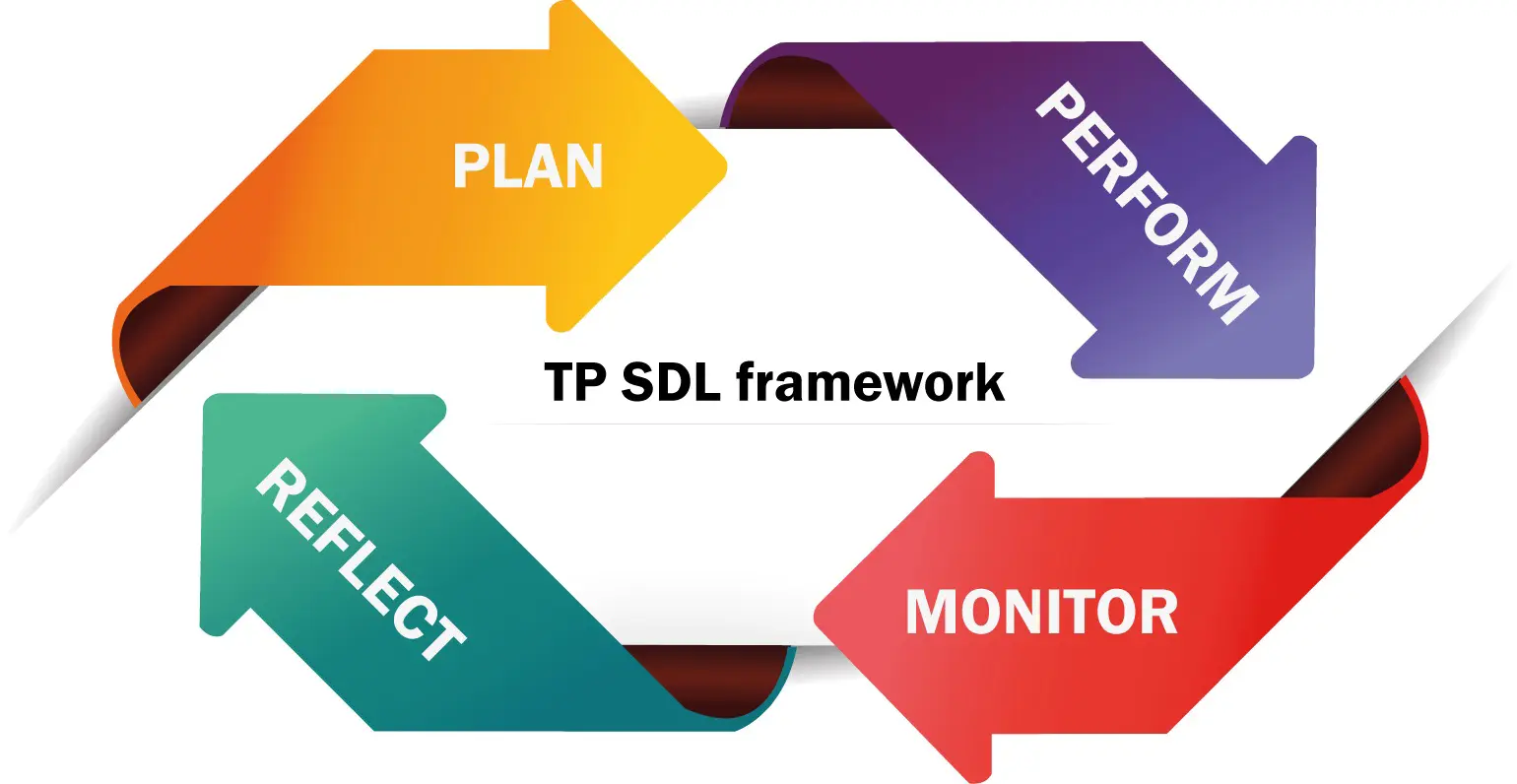
- The Plan stage involves students in analysing the learning task and formulating a plan to complete the task.
- The Perform stage involves the process of maintaining concentration and interest through the use of strategies as students work on the learning task.
- The Monitor stage enables students to judge their tasks and formulate reasons for their results.
- The Reflect stage supports students in building a clear understanding of the adequacy and quality of their work.
The PPMR process is not linear, and can be deployed as a cyclical process or iterated in as many permutations that suit the design of the subject.
Problem-based Learning (PBL) is a learner-centred educational approach with the potential to develop learners with integrated knowledge, collaborative teamwork skills and change readiness. This approach also helps learners acquire critical as well as creative thinking skills and life-long learning attributes.
At TP, PBL is used as a curriculum approach at the subject level. Learners would work their way through an ill-structured programme both as a a stimulus for learning and a focus for organising what has been learned for later recall and application to future work.
In the process, students are guided by the TP PBL framework comprising:
- The TP PBL Essentials (The philosophical underpinnings of PBL)
- The TP 7 –stage PBL Process (the different learning stages), and
- The thinking tool of a FILA chart (comprsing of Facts, Ideas, Learning Issuesa and Action Plans)

As one of TP’s key pedagogies, e-learning permeates all aspects of learning and teaching. It may take the form of wholly e-learning sessions, blended learning or flipped classrooms.
TP’s e3 framework leverages on the use of digital technologies that not only provides learning on demand, anytime and anywhere, but also many opportunities for collaborative learning beyond the classroom. TP’s aim in expanding online learning opportunities for students is to develop in them a spirit of lifelong learning.
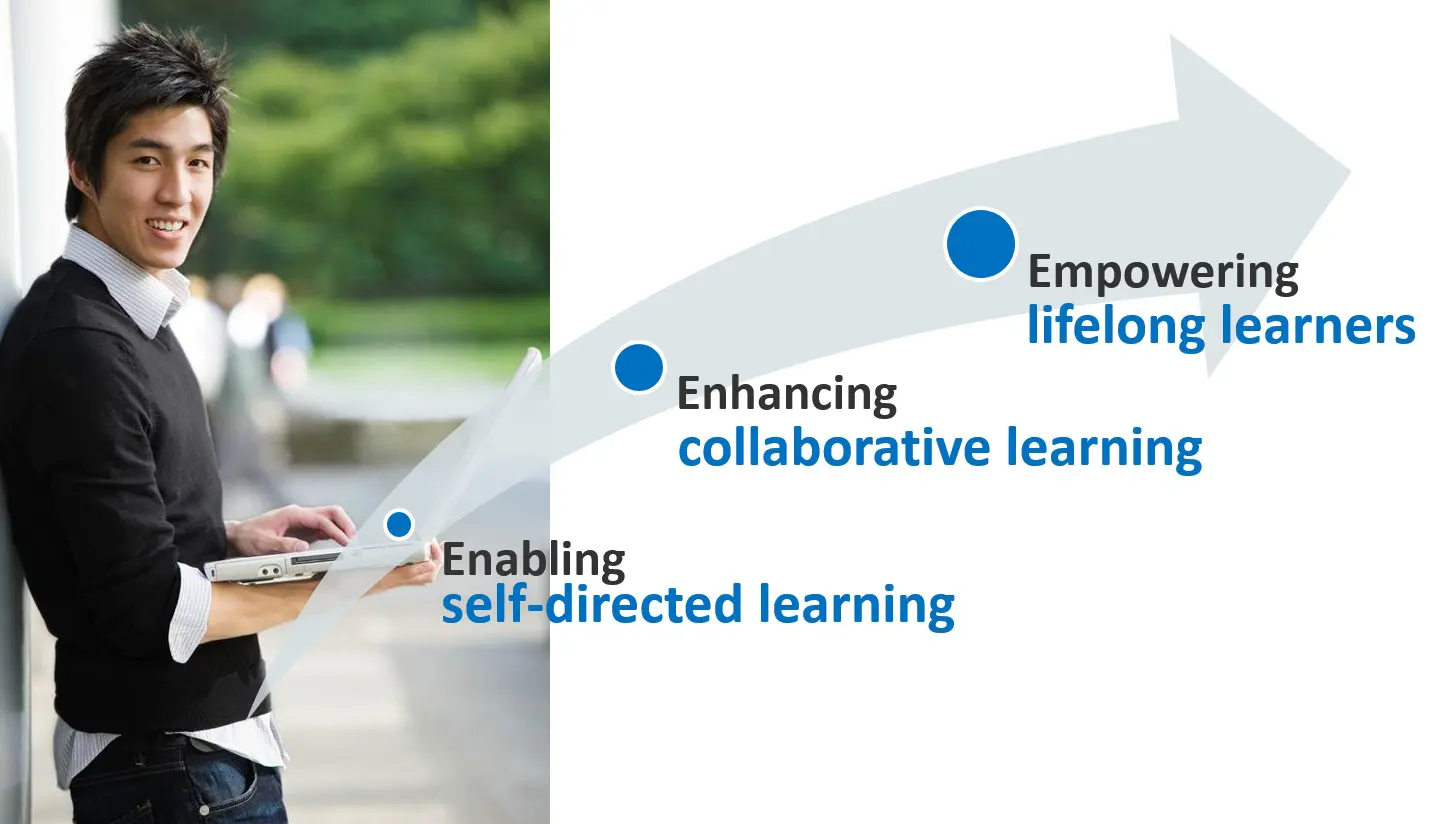
In the area of e-learning, the Learning Academy aims to enhance the skills of academic staff to integrate information and communication technology into learning and teaching contexts.
Learning Academy provides professional development for staff using the Learning Management System in TP, develops e-learning materials in collaboration with staff, and encourages best practices in e-learning and interactive digital media.
TP utilises the 5E model in relation to flipped learning.
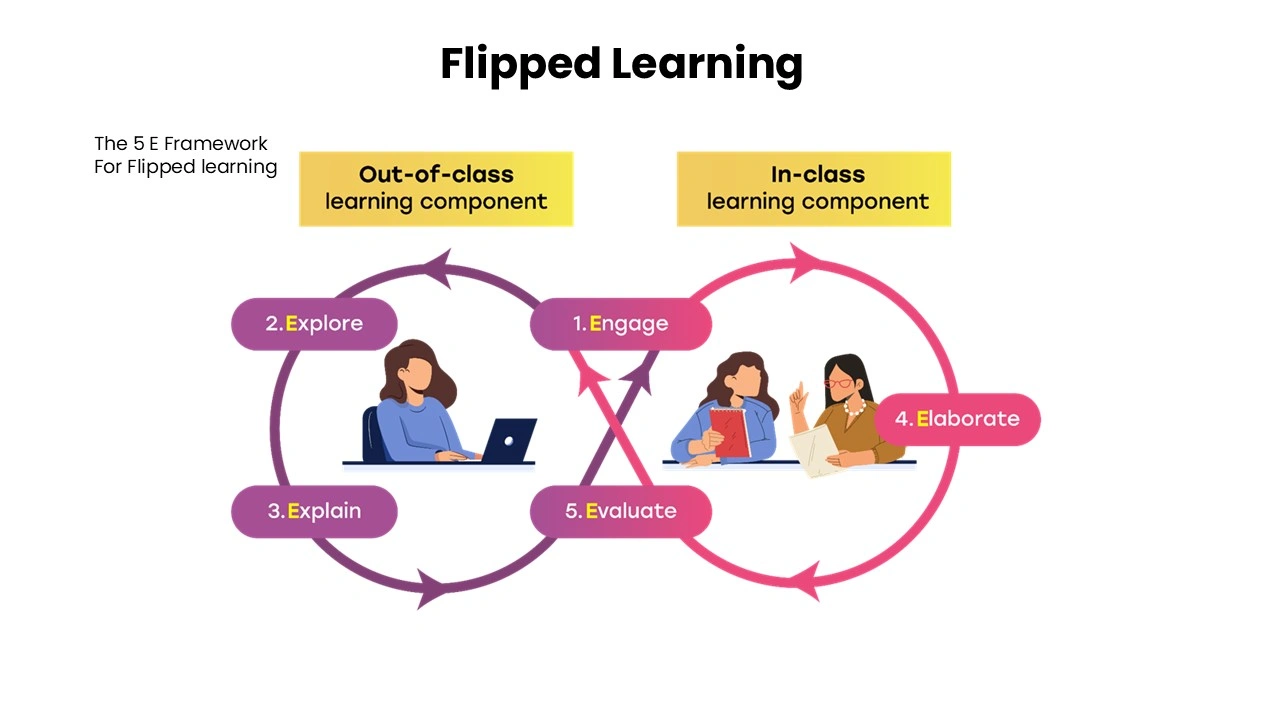
Learning Academy provides professional development for staff using the Learning Management System in TP, develops e-learning materials in collaboration with staff, and encourages best practices in e-learning and interactive digital media.
Temasek Polytechnic believes that students would need to go beyond their own disciplineary knowledge and skills to understand other disciplines, and to synthesise and integrate these, into a unified or coherent knowledge framework. This is needed for our graduates to work seamlessly in interdisciplinary teams. Students should be able to display problem solving and critical thinking, as well as communicate and collaboration in such environments. This would allow them to handle more complex problems, and to adjust to a variety of job roles.
TP’s desired learning outcomes under this framework is for students to:
1. Integrate and synthesise knowledge from different disciplines
2. Apply Problem Solving & Critical Thinking Skills
3. Engage in Multidisciplinary Communication & Collaboration, and
4. Demonstrate an Agile Mindset
Over the three years, TP students will be exposed to IDL. They will begin with appreciating IDL, then moving on to applying IDL and integrating and synthesising two or more disciplinary bodies of knowledge.
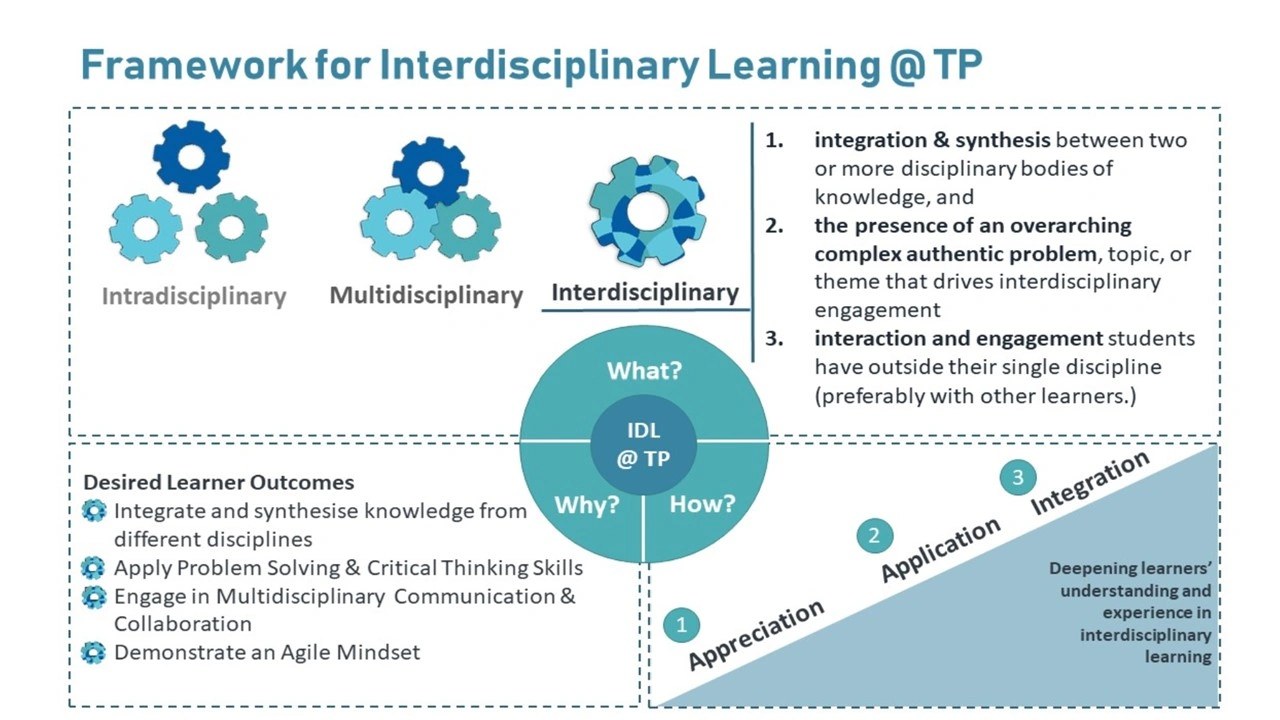
Essential criteria for Interdisciplinary Learning @ TP
1. integration & synthesis between two or more disciplinary bodies of knowledge,
2. the presence of an overarching complex authentic problem, topic, or theme that drives interdisciplinary engagement
3. interaction and engagement students have outside their single discipline (preferably with other learners.)
TP implements this framework at a polytechnic level, where different Schools or different Diplomas in a School work together at the curriculum and subject planning.
Certificate in Teaching & Learning for Polytechnic Educators (CTLPE)
Since 2019, all new lecturers to Temasek Polytechnic undergo their initial teacher training through the Certificate in Teaching & Learning for Polytechnic Educators (CTLPE). This is a joint-polytechnic programme for all polytechnic lectures, that has been co-developed and co-delivered by all the polytechnics.
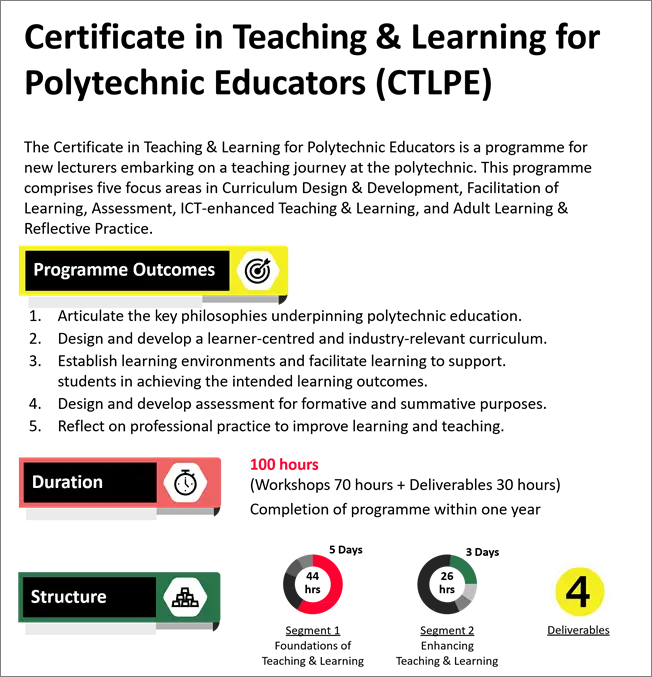
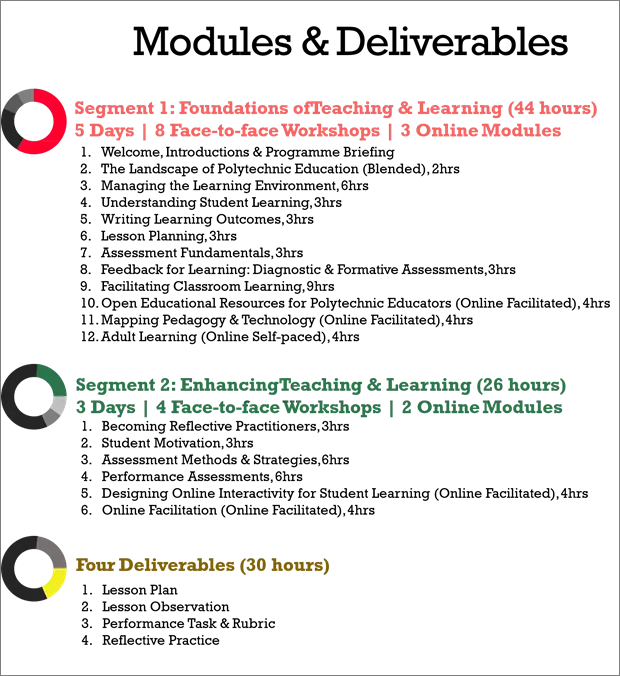
Short courses:
Gen AI (as part of the Gen AI roadmap for TP staff)
TP has implemented a learning roadmap designed to build AI competencies for all TP staff in order to provide a practical foundation in AI and empower staff to integrate AI responsibly and effectively into our professional roles.
LA supports and facilitates this through a series of professional development workshops in using Gen AI tools to facilitate learning and assessment. Foundation online workshops for all TP staff are also offered.
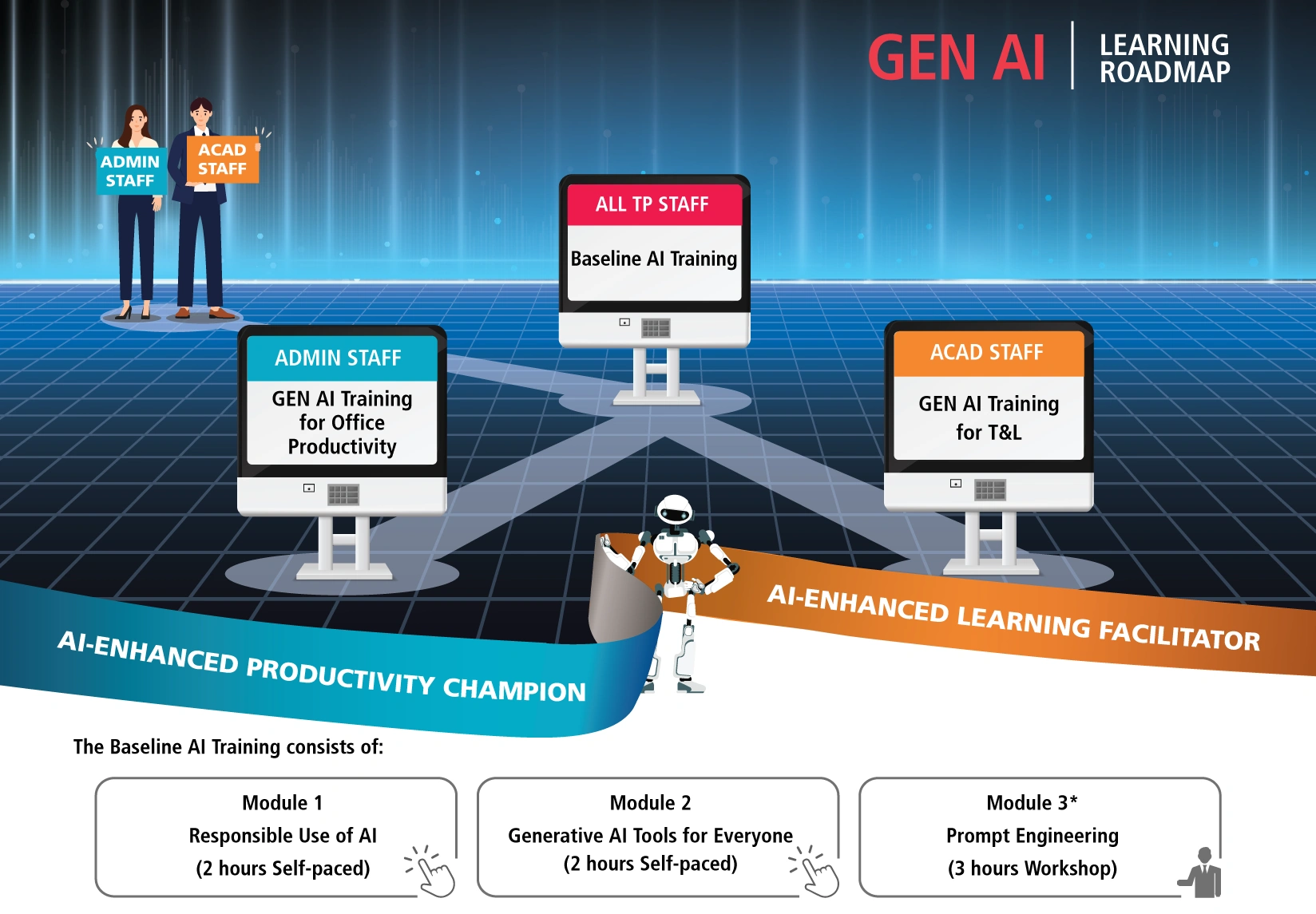
Examples of some of these workshops are found here.
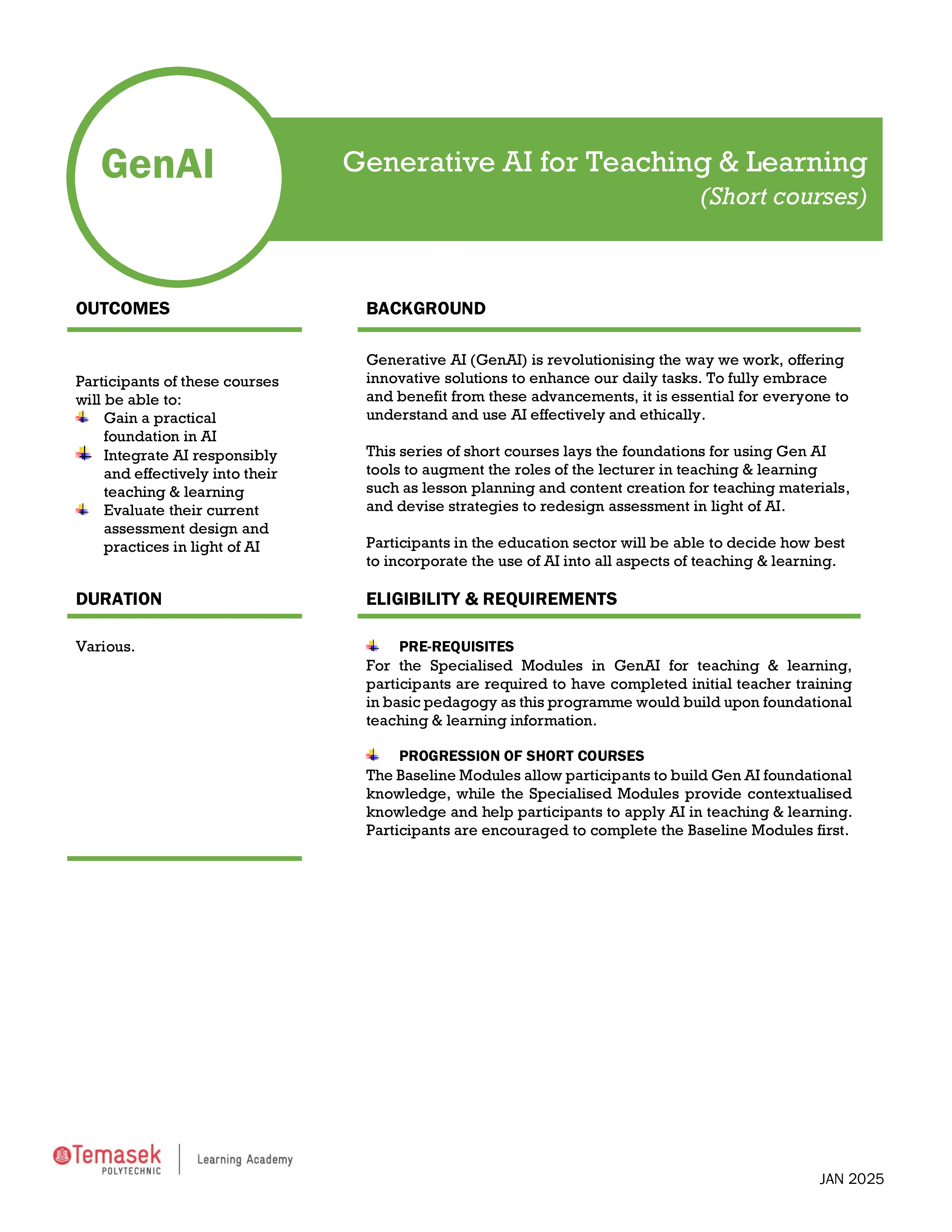
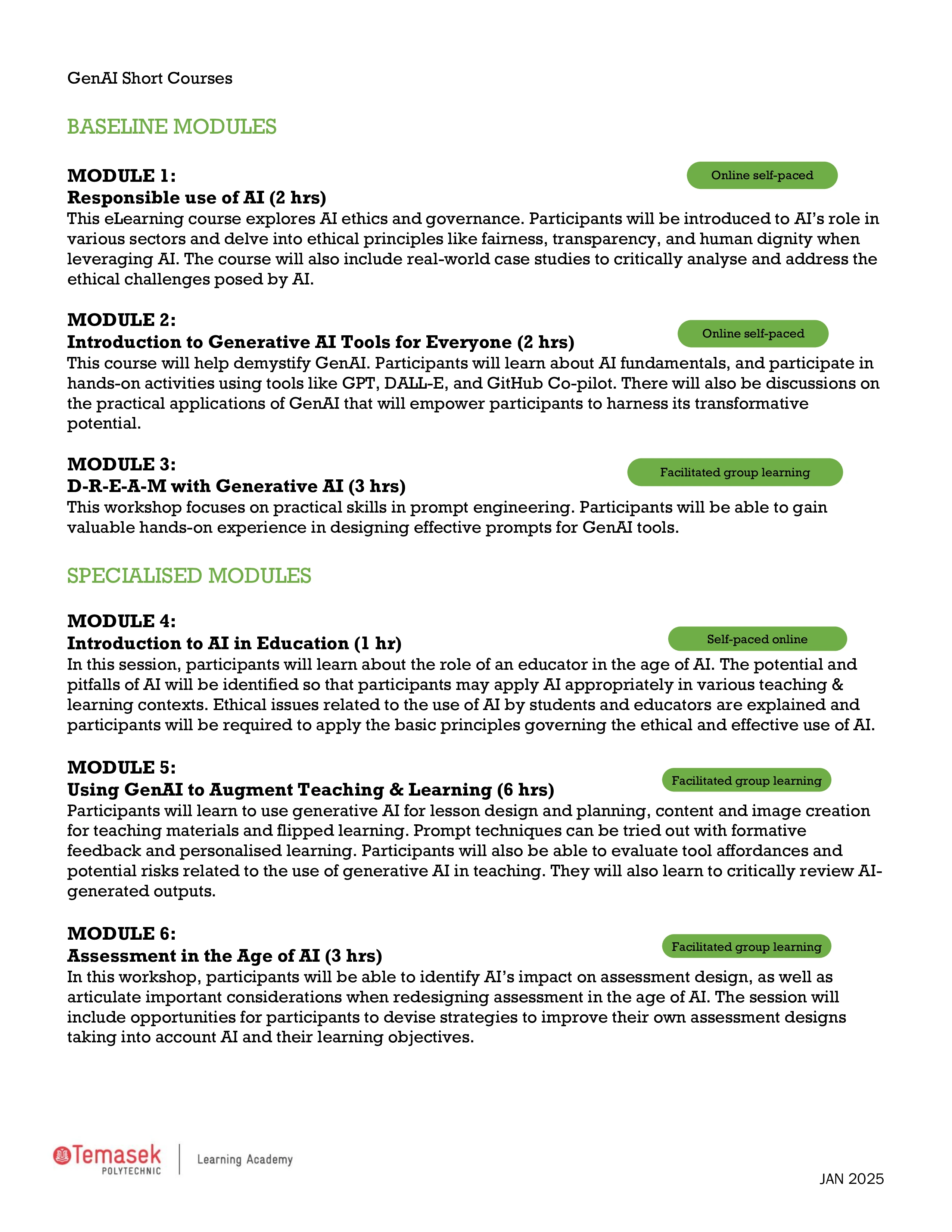
Educational Research
The Learning Academy aims to nurture a culture of research at TP by supporting staff in educational research and discussing contemporary higher education issues. We enhanced the staff’s academic research capabilities by promoting sound educational research methodology and practices.
We also help to provide information on educational research developments and promote effective use of research evidence to inform curriculum and learning-teaching practices. Staff are encouraged to undertake educational research through formal staff development programmes or projects.
In terms of funded educational research, three TP projects have successfully applied for the Ministry of Education’s Tertiary Education Fund (TRF). The fund aims to empower educators to improve teaching and learning practices based on research and data.
Conference presentations and publications
Staff from the Learning Academy regularly collaborate with colleagues from the Schools and Centres in TP to share their research through conference presentations and publications. The focal point of such synergistic collaboration is to research practice-based curricular interests core to polytechnic education. The research projects focus on different pedagogy areas, including developing self-directed learning, e-learning, facilitation, learning analytics, holistic education, and assessment.
Supporting Pedagogy@TP and Beyond
LA also supports TP in the implementation and fine-tuning of strategies and initiatives to support our students better. Some current focus areas include:
- Personalised learning : TP believes personalised learning is a critical need in today's education landscape. It addresses the diverse needs of learners, leverages technological advancements, prepares students for the dynamic job market, and promotes a culture of lifelong learning and adaptability.
- High tech, high touch: As part of TP’s vision for personlised learning, the polytechnic is working towards areas of personal coaching, mentorship and other forms of human interaction for customised support and guidance (also known as high touch), as well as leveraging AI and analytics for customised learning experiences, content delivery and learning support (high tech)
Joint-polytechnic Sector Teaching & Learning
LA contributes on behalf of TP for strengthening the T&L of the sector as a whole. As part of the Joint-polytechnic committee to enhance teaching & learning (JP-CETL) (established in 2013), TP provides inputs on strategic projects, and LA also supports the implementation and operationalisation of the resulting frameworks and programmes back in the polytechnic on the ground. Sectorial programmes that resulted from such strategic projects included frameworks and expectations for school and course leaders, as well as move-in programme for such leaders, in the form of the joint-polytechnic School Leadership Move-in Programme (SLMP), the Course Leadership Move-in Programme (CLMP), as well as the Teaching & Learning Mentors Move-in Programme (TLMP).
The sectorial staff development programmes are helmed by the Joint-Polytechnic Academy for Polytechnic Educators (JP-AcE)
Learning Academy’s Staff and Associates
The Learning Academy staff are experienced teachers and adult educators with professional qualifications and years of work experience in accountancy, business, communication skills, computer engineering, design, education, information technology, law, the life sciences, and the social sciences. This combination of expertise and knowledge makes them uniquely suited to help polytechnic lecturers translate their industry knowledge into quality learning-teaching.
The Learning Academy staff are committed to enhancing student learning through staff development programmes and initiatives. They guide lecturers in their work, supporting, assisting and providing pedagogical insights and advice as needed. Initiatives to strengthen TP’s pedagogical practices, such as taskforces, award schemes, curriculum review projects, mentoring and research projects, are also facilitated by the Learning Academy’s team of full-time staff.
Learning Academy Management
TP’s Academic Mentorship Model
In Temasek Polytechnic, Leading Academic Mentors (LAMs) (based at the Learning Academy) and Senior Academic Mentors (SAMs)(based in the Schools) lead in areas of pedagogy, research, innovation and mentoring. SAMs often work closely with LA in their work of pedagogical development.
Learning Academy Associates
Learning Academy Associates are lecturers from the various Schools and Academic Centres in TP who work in partnership with the Learning Academy. Based on the needs of the respective Schools/Centres, they contextualise Learning Academy’s professional development programmes and initiatives and help to facilitate the sharing of effective educational practices. Other areas of involvement may include facilitating selected programmes or conducting educational research.
President’s Award for Teachers
Administered by the Ministry of Education and the Academy of Singapore Teachers, the President’s Award for Teachers (PAT) gives national recognition to the critical role teachers play in moulding the future of our nation. These teachers prepare students for life, as well as model commitment to continuous learning and enterprise. They inspire both their students and peers through their words and deeds.
Please click here for a list of current PAT recipients.
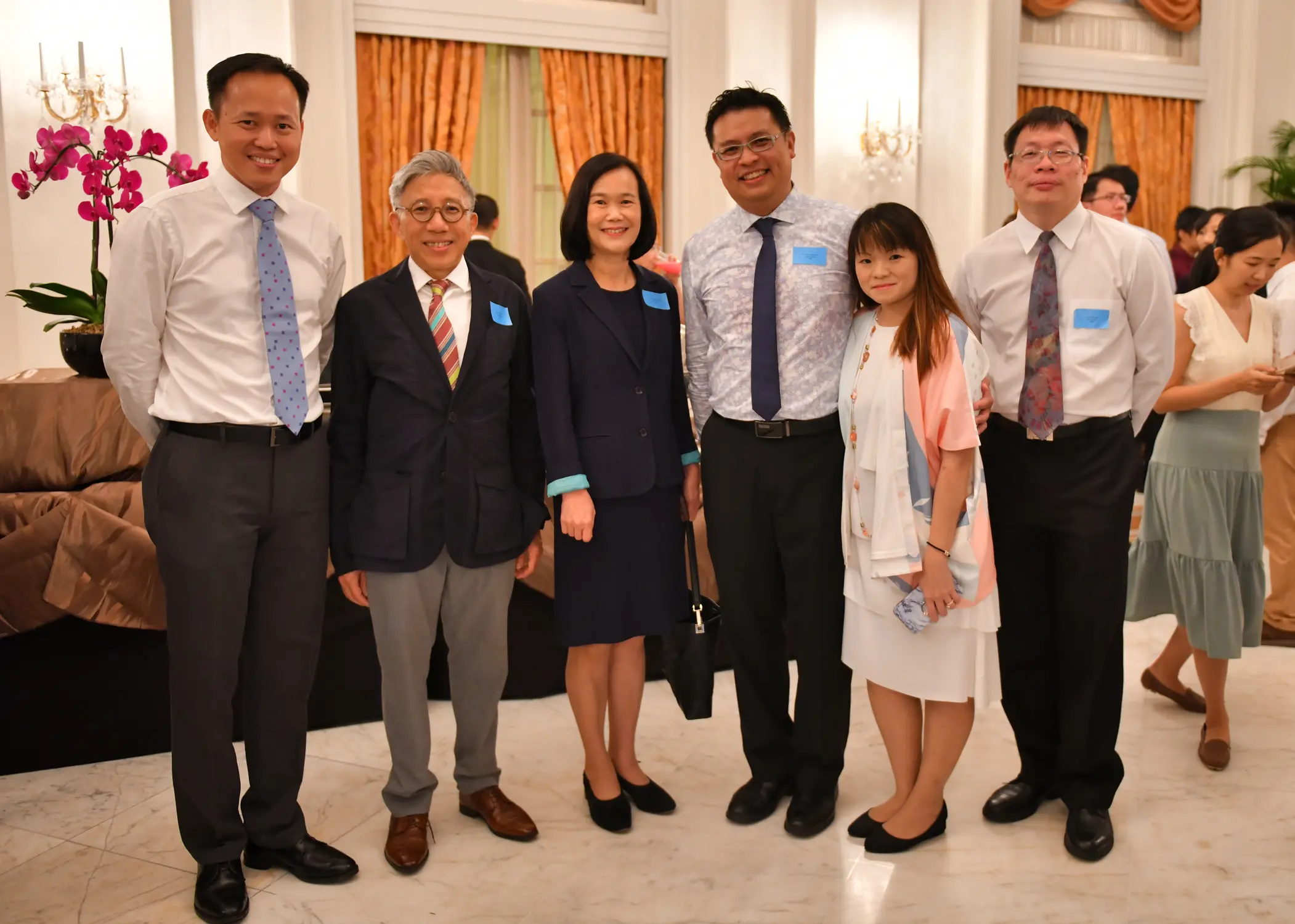
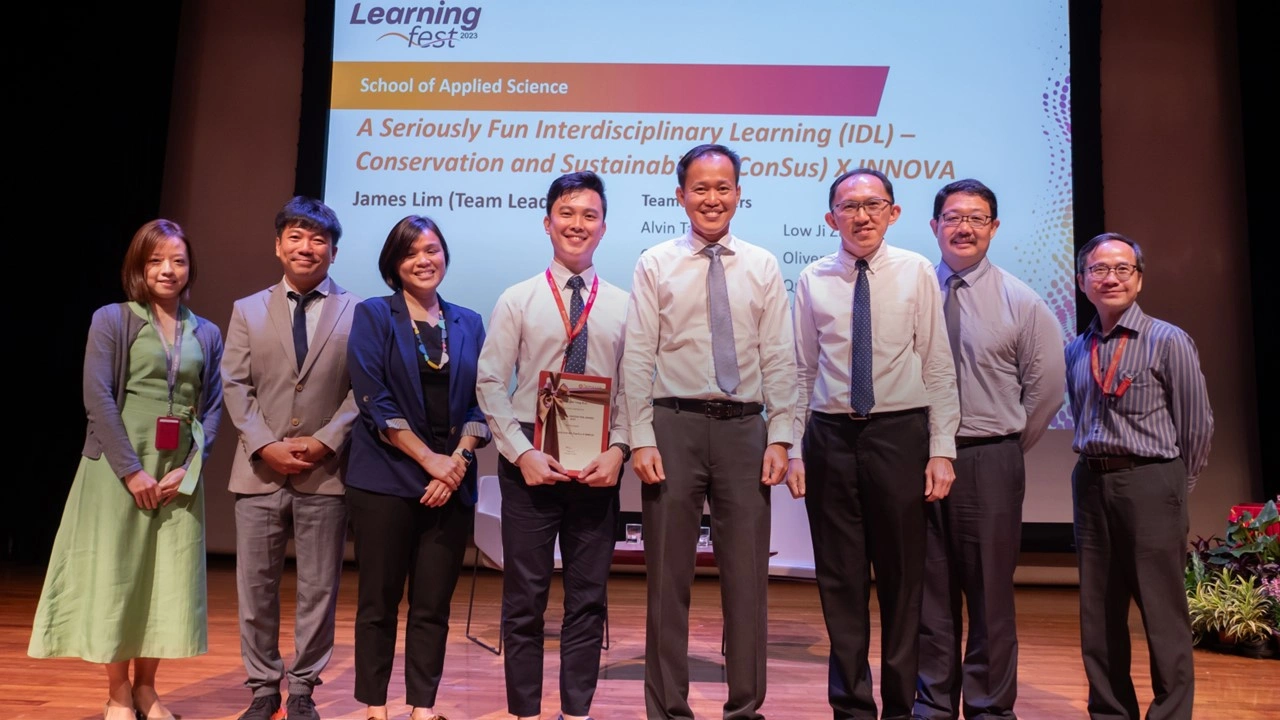
Educational Innovation Award
The Educational Innovation Award (EIA) acknowledges outstanding contributions toward enhancing student learning. It is awarded for acts, products, or approaches that define the creation and delivery of significantly different and innovative experiences which enhance student learning. It is hoped that the award will encourage replication and further development of innovation.
Please click here to see the latest teams of EIA recipients.
Teaching Excellence Award
The Teaching Excellence Award (TEA) recognises and motivates teaching staff who have demonstrated significant impact on student learning through their teaching practices. These award recipients who are exemplary in enhancing their students’ learning experience and development, also serve as role models for their colleagues.
Please click here for a list of current TEA recipients.
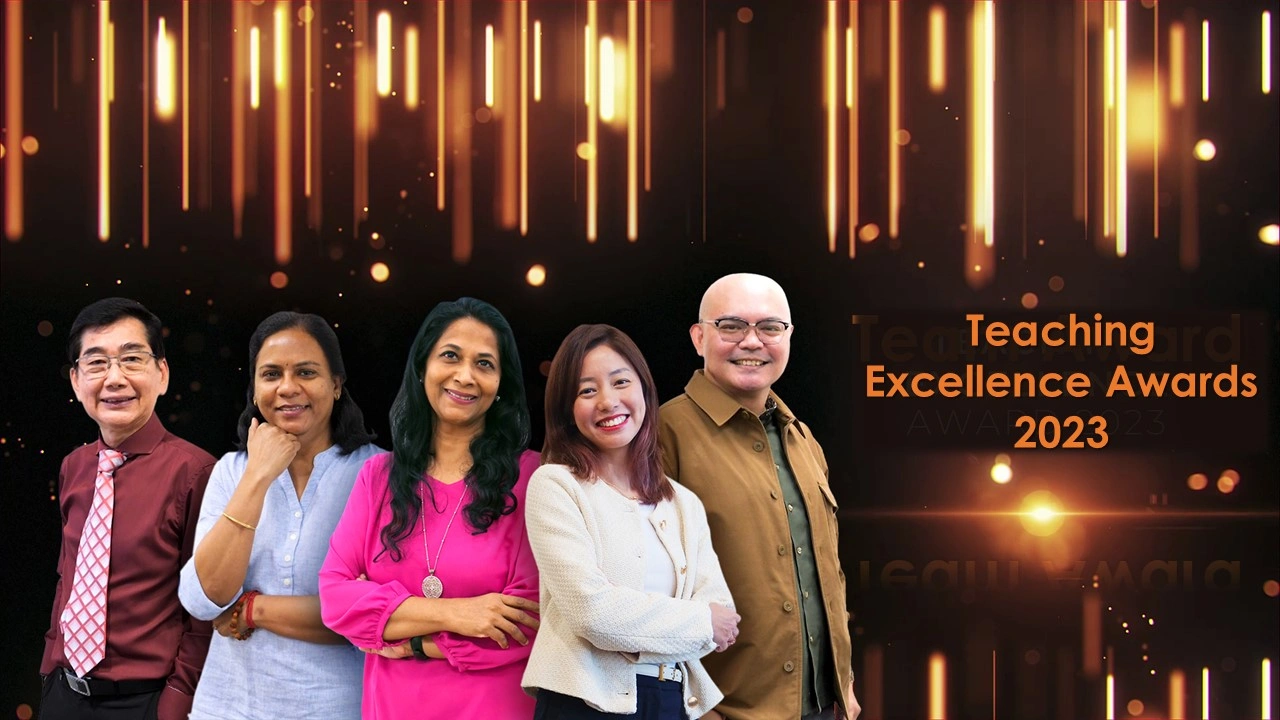
Contact Details
- learningacademy@tp.edu.sg
- 8.30 am to 6.00 pm (Mon to Thurs). 8.30 am to 5.30 pm (Fri) Closed on Sat, Sun & Public Holidays
-
Learning Academy
Temasek Polytechnic
Administrative Block 9
Lobby C, level 5
21 Tampines Avenue 1
Singapore 529757

